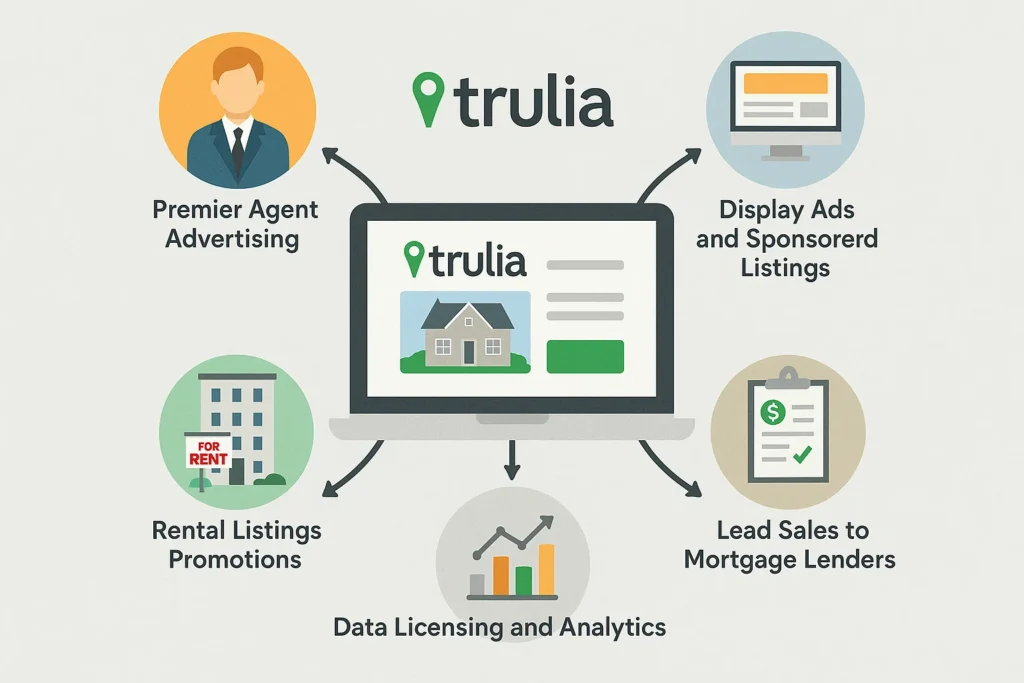Trulia has become a household name in the online real estate space, especially for U.S. renters, buyers, and investors seeking homes through a mobile-first experience. Now part of the Zillow Group, Trulia combines user-friendly design with deep market insights to help people make informed housing decisions. From neighborhood crime maps to mortgage calculators and school ratings — the platform goes beyond listings to deliver a full-stack home discovery journey.
But how does Trulia works and make money when users browse listings for free?
In this blog, we’ll break down Trulia’s revenue model, explore how it generates income without charging the typical end user, and show how startups can replicate this monetization strategy using a Trulia clone from Miracuves.
How Trulia Makes Money
Trulia operates on a platform-based business model where real estate professionals, advertisers, and mortgage providers pay to access or promote to its massive user base. Despite being free for homebuyers and renters, Trulia generates strong revenue through:
- Premier Agent Advertising – Real estate agents pay to appear on listings in select zip codes.
- Display Ads and Sponsored Listings – Brands and local businesses advertise across Trulia’s platform.
- Lead Sales to Mortgage Lenders – Trulia connects users to mortgage providers and charges for those leads.
- Rental Listings Promotions – Property managers and landlords pay to boost visibility of rental units.
- Data Licensing and Analytics – Trulia monetizes access to housing data through B2B partners.

This model is scalable, low-friction for users, and ideal for ad-driven monetization in real estate — a high-value industry with long sales cycles and informed decision-making.
Detailed Breakdown of Revenue Channels
Premier Agent Advertising
Trulia’s biggest revenue generator is its Premier Agent program. Real estate agents pay to have their profile and contact details featured on high-traffic property listings in targeted zip codes. When a homebuyer clicks “Contact Agent,” that lead goes to a paying Premier Agent — not necessarily the listing agent.
- Who Pays? Real estate professionals and brokers.
- Why It Scales? Agents bid for premium zip codes, increasing Trulia’s earnings in high-demand areas.
Display Ads and Sponsored Listings
Trulia runs display ads from insurance companies, moving services, home décor brands, and local businesses. Listings can also be “sponsored” to appear higher in search results. These ads are targeted and contextually placed, maximizing click-through rates.
- Who Pays? National advertisers, service providers, and real estate marketers.
- Why It Scales? High-volume page views across listings and tools attract advertisers in the home services ecosystem.
Lead Sales to Mortgage Lenders
When users search for home loans, calculate mortgage rates, or pre-qualify for financing, Trulia partners with mortgage providers to offer rates. In exchange, lenders pay per lead or click — a typical performance marketing model.
- Who Pays? Banks, NBFCs, and online mortgage lenders.
- Why It Scales? Every qualified lead is highly valuable, given the transaction size of home loans.
Rental Listings Promotions
Landlords and property managers can list rentals for free, but many pay for enhanced exposure — such as featured placement, richer media, or boosted ranking in search results. It’s similar to classified ad monetization.
- Who Pays? Property management companies, landlords, and rental agents.
- Why It Scales? Repeat listings and renewals create steady revenue, especially in urban rental hubs.
Data Licensing and Analytics
Trulia collects rich data on neighborhoods, pricing trends, and user behavior. While most of this data is used internally or within Zillow Group, some is licensed to institutional partners, marketers, or public agencies for analytics and research.
- Who Pays? Research firms, developers, investment companies.
- Why It Scales? Trulia can repurpose its user and market data without affecting user experience.
Trulia mastered the art of turning casual visitors into serious leads—explore the Trulia app marketing strategy that drives both buyers and renters.
Why This Revenue Model Works in 2025
Trulia’s monetization model thrives in 2025 because it aligns with how modern consumers shop for homes — digitally, locally, and over extended timelines. Here’s why its revenue engine remains strong:
Shift to Online Home Discovery
Homebuyers and renters now begin their property search online. Platforms like Trulia, with robust filtering and mobile-first UX, attract millions of users — giving real estate agents and advertisers strong motivation to pay for visibility.
High-Intent Lead Generation
Buying a home is one of the most considered purchases in a person’s life. Leads from Trulia are high-quality and often ready to act. This allows Trulia to charge premium rates to agents and mortgage lenders for access to these leads.
Geographic Targeting and Dynamic Ad Pricing
In 2025, Trulia leverages dynamic pricing algorithms, allowing Premier Agent spots in high-demand zip codes to command higher prices. Agents can tailor their ad spend to local opportunities, creating bidding-based revenue optimization.
Rise in Remote Home Buying
With remote work and relocation trends still active post-pandemic, users rely more on digital tools, neighborhood insights, and virtual walkthroughs — areas where Trulia excels. These features keep engagement high, boosting ad visibility and lead conversions.
Growing Rental and Urban Demand
As urban rentals remain competitive, property managers are eager to boost visibility through sponsored listings. Trulia monetizes this urgency while offering users convenience and breadth of listings.
From detailed listings to 3D tours, Trulia sets the standard—explore the Trulia features every real estate app should include.
Can Startups Replicate Trulia’s Revenue Model?
Yes — and more easily than ever before.
While Trulia has had years of development, data aggregation, and strategic positioning under Zillow Group, its core revenue model is replicable by real estate tech startups. However, building it from scratch demands complex integrations, lead-routing mechanisms, monetizable ad tech, and scalable infrastructure.
This is exactly where Miracuves’ Trulia Clone steps in.
Our ready-made Trulia Clone provides everything you need to launch a property discovery platform with built-in monetization tools:
- Premier Agent-style advertising modules
- Featured listings and native banner ad placements
- Lead generation integrations for mortgage and finance services
- Admin dashboard for monetization control (pricing, visibility, lead routing)
- Location-based targeting, filters, and data-rich property detail pages
- Seamless UX for buyers, renters, agents, and advertisers alike
With Miracuves, you can focus on growing your user base and onboarding real estate partners — without getting bogged down by technical infrastructure.
The Trulia Clone by Miracuves is priced at $2,899, providing an intelligent real estate search and listing platform with VR tours, price tracking, and verified owner details — ready to go live within 3 days with complete source codes.
Launching your own real estate platform starts with the best Trulia clone scripts in 2025 to get the right features at the right price, and becomes achievable when you plan smart with the Trulia app development cost guide for 2025.
Conclusion
Trulia has built a powerful revenue model around attention, trust, and high-intent leads — not direct payments from home seekers. Through a mix of Premier Agent ads, sponsored listings, mortgage lead sales, and data monetization, it turns user traffic into a multi-channel income stream without charging the end user.
For startups looking to tap into the booming real estate tech market, replicating this model is no longer a pipe dream.
With Miracuves’ Trulia Clone, you get a launch-ready platform equipped with all the key monetization levers — ad modules, lead management, subscription options, and more — designed to help you start generating revenue from day one.
FAQs
How does Trulia generate revenue?
Trulia makes money primarily through Premier Agent advertising, rental listing promotions, display ads, mortgage lead referrals, and occasional data licensing to partners.
Is Trulia profitable in 2025?
As part of Zillow Group, Trulia contributes to a highly profitable ad-driven real estate ecosystem. Its scalable ad model and high-intent user base continue to generate strong returns in 2025.
What are the main income sources for Trulia?
Trulia’s income comes from real estate agents who pay for lead visibility, advertisers who promote related services, rental managers who boost listings, and lenders who pay per mortgage lead.
Can startups use the same revenue model as Trulia?
Yes, but building it from the ground up takes time and capital. A Trulia clone from Miracuves enables startups to quickly implement the same monetization strategies with out-of-the-box features.
Does Miracuves offer a Trulia clone with monetization features?
Yes. Miracuves provides a Trulia Clone with built-in modules for lead monetization, ad placement, Premier Agent-style listings, and admin control over commissions and visibility settings.








